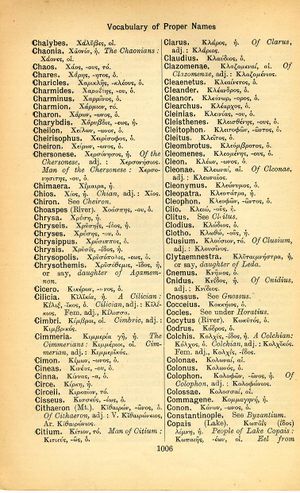Colossae
ἀναβάντα γὰρ εἰς τὴν ἀκρόπολιν, καὶ διὰ τὴν ὑπερβολὴν τῆς λύπης προσκόψαντα τῷ ζῆν, ἑαυτὸν κατακρημνίσαι → for he ascended the acropolis and then, because he was disgusted with life by reason of his excessive grief, cast himself down the height
English > Greek (Woodhouse)
Κολοσσαί, αἱ.
Latin > English (Lewis & Short)
Cŏlossae: ārum, f., = Κολοσσαί,
I a city of Phrygia on the Lycus, now Khonas; to the church in this place Paul's Epistle to the Colossians was addressed, Plin. 5, 32, 41, § 145; Vulg. Col. 1, 2.—Hence,
A Cŏlos-senses, ium, m., the Colossians, the inhabitants of Colossœ, Ambros. Spir. Sanct. 2, 20.—
B Cŏlossīnus, a, um, adj., = Κολοσσῖνος, of or belonging to Colossœ: flos, Plin. 21, 9, 27, § 51.
Latin > French (Gaffiot 2016)
Cŏlossæ, ārum, f., ville de Phrygie : Plin. 5, 145 || -īnus, a, um, de Colossæ : Plin. 21, 51 || -ēnsēs, ĭum, m., habitants de Colossæ : Tert. Res. 23.
Latin > German (Georges)
Colossae, ārum, f. (Κολοσσαί), Stadt in Phrygien am Lykus, j. Khonas, an deren Einwohner der Apostel Paulus den bekannten Brief an die Kolosser (Κολοσσαεις) richtete, Plin. 5, 145. Vulg. Coloss. 1, 2. – Dav.: A) Colossēnsēs, ium, m., die Einw. von Kolossä, die Kolosser, Augustin. retract. 1, 26 extr. Ambros. de spir. scto 2, 20. Vulg. ep. ad Coloss. lemm. (wo Colosenses). – B) Colossīnus, a, um (Κολοσσηνός), kolossinisch, flos, Plin. 21, 51.

